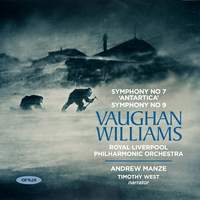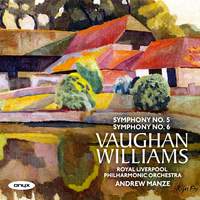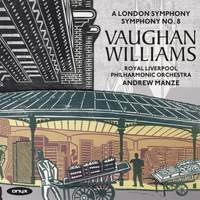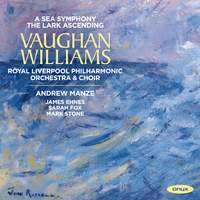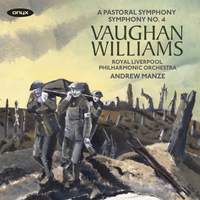Recording of the Week,
The final instalment of Andrew Manze's Vaughan Williams cycle with the Liverpool Philharmonic
Today’s Recording of the Week is the culmination of Andrew Manze’s acclaimed Vaughan Williams symphony cycle with the Royal Liverpool Philharmonic Orchestra – with the violinist-turned-conductor taking on the two works widely regarded as the least approachable of all Vaughan Williams’s symphonic output, Nos. 7 and 9. They form an apt pairing in many ways, showing the full flowering of the composer’s skill towards the end of his life (indeed, No. 9 was set to receive its premiere recording the day after Vaughan Williams’s death).
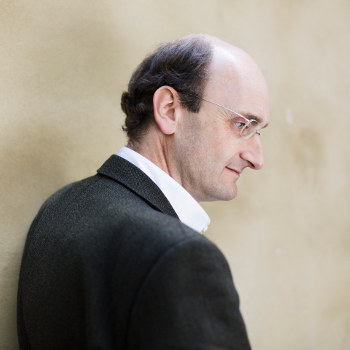 No. 7, subtitled ‘Sinfonia Antartica’, is heavily based on Vaughan Williams’s score for the 1948 film Scott of the Antarctic, which dramatised the events of the ill-fated Terra Nova Expedition to the South Pole in the early 1910s. In the film, shortly before setting off, Scott has a discussion with a fellow explorer about whether to rely on dogs or on machines for the motive power of his expedition (eventually settling on the former). Manze has apparently had an analogous debate with himself about what sound-world to aim for, reaching the opposite conclusion; the score conceals percussive elements that, in previous recordings, have been barely audible, if at all, yet Manze has evidently made a conscious decision to draw out those more mechanical-sounding edges to the sound. The xylophone is to the fore in the second section of the first movement, and at several points in the work the bass register of the piano (which I hadn’t previously realised was even called for in this work!) cuts through the texture. It seems clear that, rather than succumbing to the temptation to let the music relax into indulgent broadness of sound as might suit some of the earlier symphonies, Manze is consistently seeking to enliven the sonic texture by highlighting the spikier elements of the scoring.
No. 7, subtitled ‘Sinfonia Antartica’, is heavily based on Vaughan Williams’s score for the 1948 film Scott of the Antarctic, which dramatised the events of the ill-fated Terra Nova Expedition to the South Pole in the early 1910s. In the film, shortly before setting off, Scott has a discussion with a fellow explorer about whether to rely on dogs or on machines for the motive power of his expedition (eventually settling on the former). Manze has apparently had an analogous debate with himself about what sound-world to aim for, reaching the opposite conclusion; the score conceals percussive elements that, in previous recordings, have been barely audible, if at all, yet Manze has evidently made a conscious decision to draw out those more mechanical-sounding edges to the sound. The xylophone is to the fore in the second section of the first movement, and at several points in the work the bass register of the piano (which I hadn’t previously realised was even called for in this work!) cuts through the texture. It seems clear that, rather than succumbing to the temptation to let the music relax into indulgent broadness of sound as might suit some of the earlier symphonies, Manze is consistently seeking to enliven the sonic texture by highlighting the spikier elements of the scoring.
The wordless vocalises in the first and last movements are of fundamental importance to the atmosphere of the work, so a special mention must go to soprano Rowan Pierce. Compared to some other recordings, her performance is audibly more naturalistic, with perceptible breathing and phrasing, and I think this fits well with the aforementioned choice by Manze of a slightly edgier, more percussive sound. In this case it tips the balance towards a warmer, more human sound-world, where previous interpretations have tended to play up the ethereal, otherworldy aspect of the polar setting.
Commentators love to describe the Ninth as “enigmatic” and “mysterious”, particularly in the light of its connection with Hardy’s Tess of the d’Urbervilles, and it certainly doesn’t yield up its secrets as readily as the Seventh. A number of recent recordings have done much to increase audiences’ familiarity with this magnificent work, however, and it seems no longer to be seen as quite such a daunting riddle. This is all to the good, as it enables conductors to start interpreting the work rather than merely trying to present it as a novelty. Manze has certainly put his mark on several passages, not least the very opening – which, in his hands, is deliberate, poised and expansive with the initial phrase unfolding completely unhurried. It’s a subtle change but very effective indeed. Likewise at the end of the movement – the gently clashing bitonality between the strings and the saxophone trio seems at odds with what one would expect from Vaughan Williams, but Manze seems to revel in it, lingering almost imperceptibly on the dissonances as if to underline the point that this, too, is “true” Vaughan Williams. The climaxes in the second movement (which in other conductors’ hands can sometimes lack subtlety) are here relatively delicate, almost reticent – and again, it’s strikingly effective.
As an ardent and lifelong Vaughan Williams fan I’m always especially pleased to see new recordings of the Ninth, surely one of the most underrated symphonies of the last century – and doubly so when they’re from musicians of the calibre of Andrew Manze and the Liverpool Philharmonic. The few slight reservations that I had when I reviewed the first instalment of this series three years ago have been swept aside; it’s a set truly worthy of mention in the same breath as the venerable cycles by Vernon Handley and Richard Hickox/Andrew Davis.
If this has whetted your appetite to hear Manze's interpretations of Vaughan Williams' other symphonies, then don't miss our special offer, with 20% off the previous volumes until 22nd July.
Rowan Pierce (soprano) & Timothy West (narrator)
Royal Liverpool Philharmonic Orchestra, Ladies of the Royal Liverpool Philharmonic Choir, Andrew Manze
Available Formats: CD, MP3, FLAC, Hi-Res FLAC
Other recordings in this series
Royal Liverpool Philharmonic Orchestra, Andrew Manze
Available Formats: CD, MP3, FLAC, Hi-Res FLAC
Royal Liverpool Philharmonic Orchestra, Andrew Manze
Available Formats: CD, MP3, FLAC, Hi-Res FLAC
Sarah Fox (soprano), Mark Stone (baritone), James Ehnes (violin)
Royal Liverpool Philharmonic Orchestra, Andrew Manze
Available Formats: CD, MP3, FLAC, Hi-Res FLAC, Hi-Res+ FLAC
Royal Liverpool Philharmonic Orchestra, Andrew Manze
Available Formats: CD, MP3, FLAC, Hi-Res FLAC


